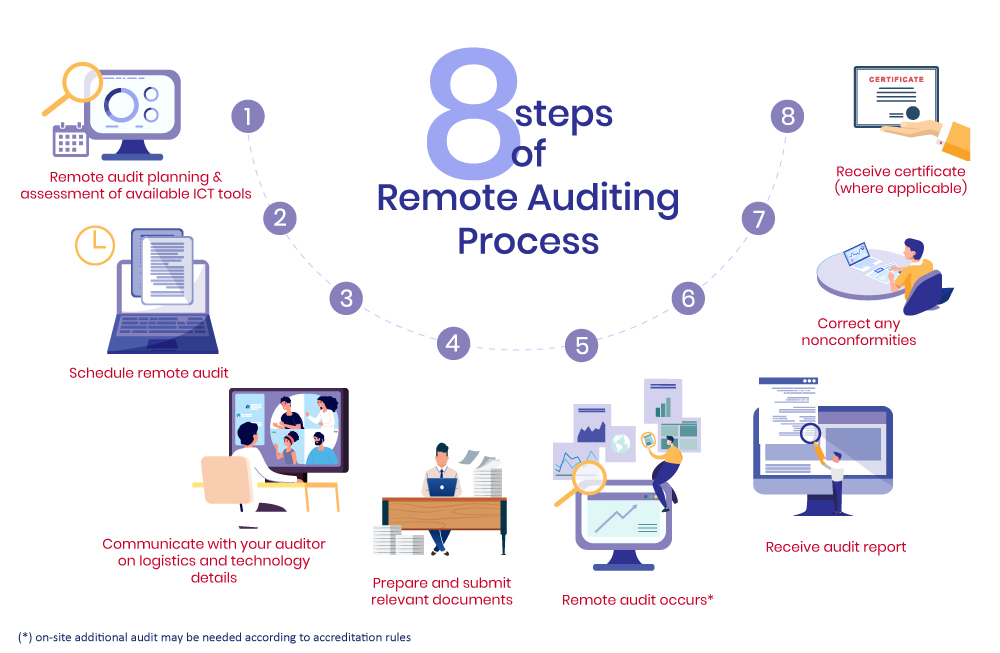
REMOTE AUDITING SOLUTION BY BUREAU VERITAS
The global coronavirus crisis continues to place unprecedented pressure on businesses of all sizes, with guidelines changing daily as the COVID-19 virus continues to spread. Our focus is of course on ensuring safety of our clients and employees, and we are committed to supporting our clients throughout this unprecedented time. As part of this support, we have put in place a new process of conducting audits using digital technology in order to ensure the continuity of our services.
WHAT IS A REMOTE AUDIT?
A Remote Audit is conducted when an offsite auditor audits a client’s company processes, policies, procedures and personnel in real-time through ICT (Information and Communication Technology). An auditor can interview auditees through video conferencing tools, having the possibility to review (using screen sharing functionalities) the documents remotely while asking questions or precisions.
Remote audits can be delivered (*) for any process that does not require to be on-site verified checking a running process (ie: industrial or manufacturing).
(*) Standard eligibility and remote audit conditions are determined by each accreditation body, oversight body or scheme owner and must be respected.
HOW AUDITS ARE CONDUCTED?
At Bureau Veritas we mainly use Microsoft Teams for video conferencing but are flexible to use other tools such as Zoom or Skype based on what works best for our clients.
WHAT ARE THE STEPS OF REMOTE AUDIT PROCESS?

WHAT ARE THE SUCCESS CONDITIONS FOR AN EFFECTIVE REMOTE AUDIT?
Key prerequisites for an effective and efficient remote audit:
|
Document preparation: Make sure the documents are ready and available to be shared on the screen with the auditor. As an on-site visit is not possible, make sure all documents are accessible remotely and can be shared online. |
|
ICT tool & good Connectivity: Make sure your network has enough bandwidth to support multiple connected people on the digital meeting with screen sharing. In case a specific room is needed for better connectivity assure its availability for audit time. |
|
Security & confidentiality: Make sure you have a secured network with VPN (Virtual Private Network) system that can be used for connecting to the ICT system. Bureau Veritas auditors, on their side, will use BV VPN. |
|
Team availability: As any certification audit, make sure all necessary people can access (and are invited) to the video conference and participate in the remote audit. People can connect anytime they need or are required to. |
|
Time management: Remote audit requires specific time management compared to on-site audit. BV auditors will adapt their auditing program accordingly. |
WHICH AUDITS CAN BE DONE REMOTELY?
Majority of accreditation bodies (*) agreed to authorize Remote Audits during the COVID-19 crisis to maintain certificate validity and business continuity. These authorizations are given using the IAF MD4/MD5 guidelines on how to conduct remote audits.
Standards like ISO 9001 (Quality Management), ISO 14001 (Environmental Management), ISO 45001 (Health & Safety Management), ISO 27001 (Information Security Management) and ISO 22000 (Food Safety Management) are eligible for Remote Auditing. In most cases, 50% of normal audit content could be delivered remotely. Under specific circumstances, the audit can be done up to 100% remotely (*). These cases are concerning only specific industry codes; mostly when there is no "on-site” activity or manufacturing process involved and for surveillance audits for example.
We encourage you to contact your local Bureau Veritas Certification team to check if your standard is eligible for Remote Audit. You can also check with your country accreditation body or your sector-specific scheme owner if your standard can be remotely audited during COVID-19 lockdown.
(*) Only accreditation bodies, oversight bodies that govern standards can define Remote Audit eligibility, conditions of applicability and acceptable % of audit that can be performed. So far (as of April 10th) there still accreditation bodies or oversight bodies that forbid Remote Audits to be conducted.
WHAT ARE THE KEY BENEFITS OF REMOTE AUDITS?
-
Maintain your certification
-
Improved efficiency of the audit due to more flexibility and reduced travel times
-
Save time and money as there is no travel required
-
Maintain business continuity during the pandemic
-
Prepare to re-start your activity when the lockdown is over
Remote Auditing Solution
Download Brochure